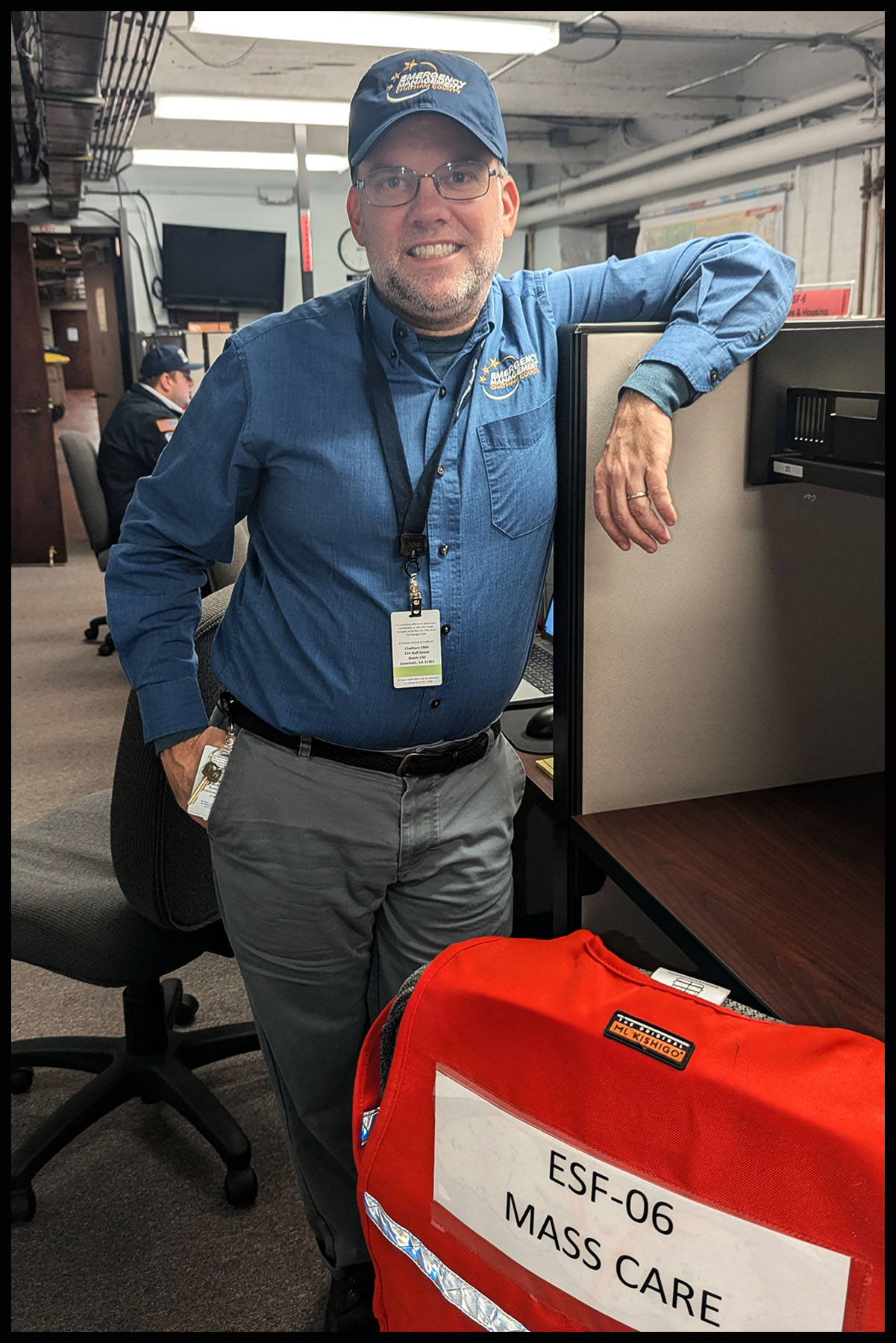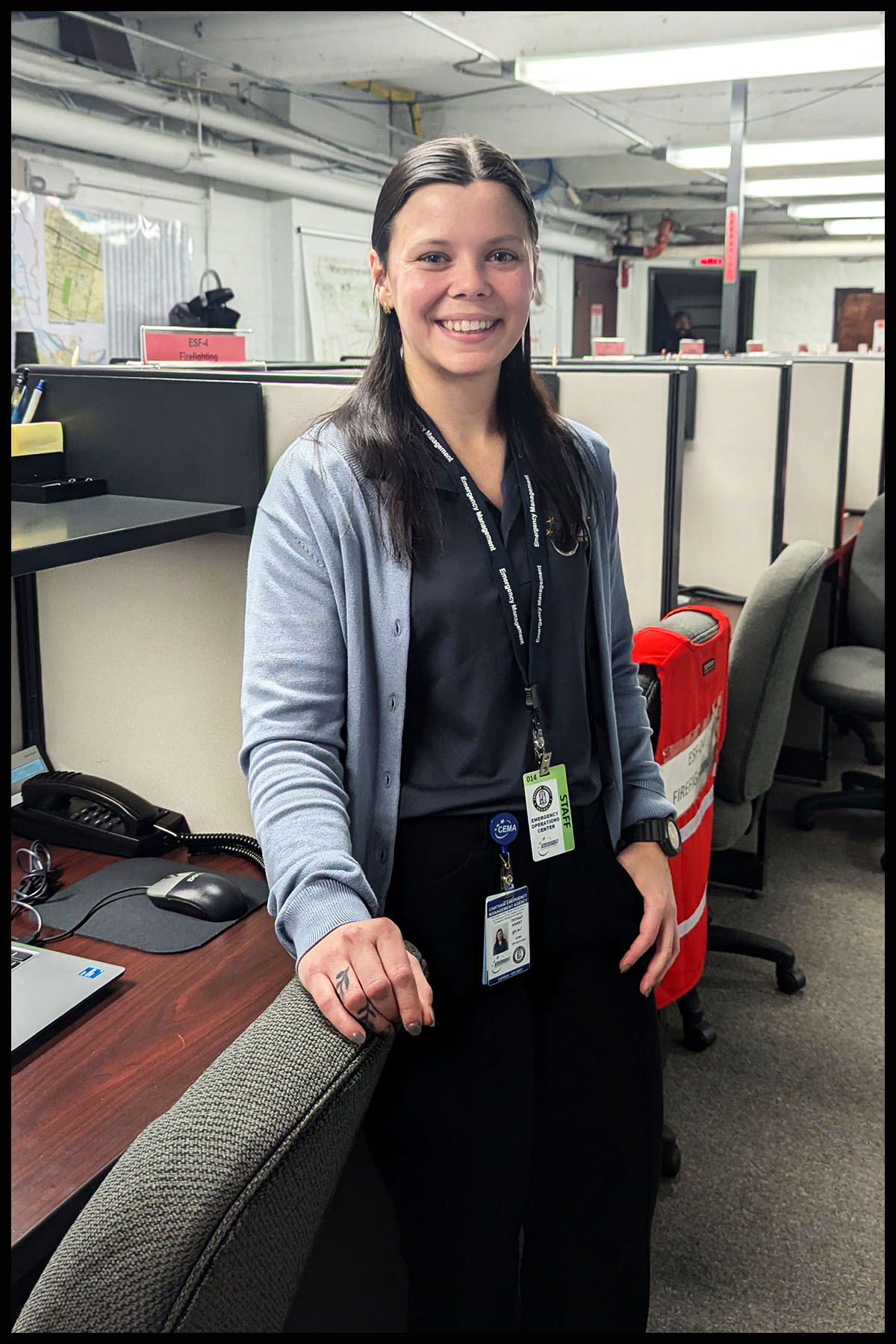
Essentially, it’s ALL about taking care of people.
Essentially, it’s ALL about taking care of people.
It’s the goal of County government, it’s the primary purpose of Chatham Emergency Management Agency (CEMA), and it’s evident from top to bottom. You can see it on a large scale when the expertly planned and practiced Emergency Operations Center (EOC) is activated to respond to a major emergency. You can also see it at the simplest human level, when CEMA professionals who are working around the clock to anticipate and respond to community needs, take a few minutes to empty EOC trash cans just because they need to be emptied. You can see it when they cook up some grits and eggs with a smile for the night shift signing off after twelve hours and the day shift coming in with the first rays of the sun to take over. You can see the care.
During emergency events, like hurricanes, the commitment to caring for people shows up as performing rescues, coordinating evacuation transportation, arranging shelters and resource centers, ensuring public safety with communications, and managing recovery clean up. During a more uncommon winter storm emergency, swiftly established public warming centers offered refuge from dangerous cold for residents who were either unhoused or who had a lack of heating.
“We’re trying to take care of individuals and populations out there. We’re taking care of each other, and we’re taking care of our vendors and partners who work with us.” Emergency Management Specialist Steven Meyer is new to CEMA, but his role in coordinating public health, human services, and mass care during the winter storm has already given him a deep appreciation for the people and organizations who partner with CEMA during emergencies. The Salvation Army, each municipality, The YMCA, the United Way, the Second Harvest Food Bank, churches, public safety agencies, and countless others are always generous supporters of County emergency relief efforts. The Chatham-Savannah Authority for the Homeless spearheaded the efforts to offer refuge from the freezing weather to anyone who needed it. The City of Savannah, the YMCA, Savannah Fire, Savannah Police, Chatham County Police, the American Red Cross, the Salvation Army, and Chatham County Mosquito Control, Parks and Recreation, and Public Works were all invaluable supporting this operation. The saying goes that it’s amazing what can be accomplished if no one cares who gets the credit, and Steven saw it first-hand. “It’s all about the people. There’s no ego.”
Steven came to CEMA just a few months ago after 13 years serving our community as an Animal Services Officer, so he brings with him that problem-solving approach. “I focus on ‘Here’s what’s needed, let’s get there.’ Animal Services, by nature, is situationally reactive: there’s an issue, let’s fix it.” Steven brings another useful skillset from an unusual source, too – his years of working with improv theater have developed locked-in listening and a nimble ability to pivot to work with whatever arises in the moment. “When you’re fully engaged with people, you realize you’re there to address a specific thing. What’s the goal? In this case the goal is to provide a space for this population to get out of the cold, to make use of a partner facility and then return it in like new condition – just because we should. I mean why do we exist? Why do humans organize in societies but to help each other?”
 Steven’s counterpart on the night shift of the EOC is just as passionate about this role and just as new to CEMA. Emergency Management Specialist Tiffany Arant has been with CEMA only two months, but mentally she’s been here all her life. An intense near-disaster experience when she was a small child set her on a laser-focused path to work in this field. With a Masters Degree in Emergency Management and experience working with USDA and with Emergency Management in Union County, NC, she made the leap to Chatham County and has hit the ground running. Calm and centered, she’s on a mission. “I’ve always been in government operations. I started thinking very young that this is how we have to approach things. With compassion. With understanding. And when you’re speaking with other government operations, you already have that base understanding, because you work in it day to day. . . so there’s absolutely no reason that we shouldn’t be able to have a human conversation and figure everything out.”
Steven’s counterpart on the night shift of the EOC is just as passionate about this role and just as new to CEMA. Emergency Management Specialist Tiffany Arant has been with CEMA only two months, but mentally she’s been here all her life. An intense near-disaster experience when she was a small child set her on a laser-focused path to work in this field. With a Masters Degree in Emergency Management and experience working with USDA and with Emergency Management in Union County, NC, she made the leap to Chatham County and has hit the ground running. Calm and centered, she’s on a mission. “I’ve always been in government operations. I started thinking very young that this is how we have to approach things. With compassion. With understanding. And when you’re speaking with other government operations, you already have that base understanding, because you work in it day to day. . . so there’s absolutely no reason that we shouldn’t be able to have a human conversation and figure everything out.”
That compassion is deep-seated in her. “I think people are extremely vulnerable during any type of disaster,” she says. The warming centers were a very considered and timely response to the need to protect lives in a community about to be incapacitated by uncharacteristic cold. The essential need was for providing a safe, heated space, however as the severe cold snap stretched into extended days and nights, Tiffany and Steven worked with partners to provide extra care. The Salvation Army prepared meals, as they so often do, and Savannah Fire went the extra mile (over snow and ice) to get them delivered to the warming centers. “I can’t say enough about them – they were wonderful!” Tiffany sees it like this: “If everybody’s helping out in any way they can, things are going to get done. You know, do your job, but if there are other things that you can do in the meantime, why not? I think everybody here is just fundamentally caring.”
It was her childhood brush with disaster, caught on an open beach as an unexpected tornado bore down on Tiffany and her family, that shaped her drive to help. “The sirens were going off, and I remember my mom not knowing what to do. My mom and my grandma grabbed my cousins and me and we had to go into a little bathroom right off of the shore. We were in stalls and we're covering our heads and you could hear the tornado just come by and the noise! -- it just feels like the world is being torn apart piece by piece, and it completely scared me to death. But when I started growing up and understanding why I was scared, it turned into motivation. It turned into a need to know why, so I can make sure that if that ever happens again my mom knows exactly what to do so she feels safe.”
She continues, “You know, with any disaster that comes through like this, it can be scary. You can't control when it's going to come through. You can't control the intensity of it. But if you have the understanding and the knowledge, then you don’t feel powerless, and you can do your best to make sure you're safe and make your family safe. And I think that's my goal here at CEMA. I have worked probably since I was that little girl in that beach-side bathroom to get to here.”
